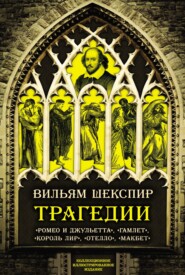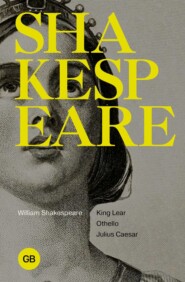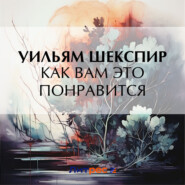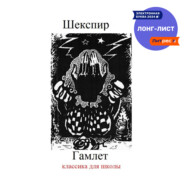По всем вопросам обращайтесь на: info@litportal.ru
(©) 2003-2024.
✖
King John
Настройки чтения
Размер шрифта
Высота строк
Поля
Being none of his, refuse him. This concludes:
My mother's son did get your father's heir;
Your father's heir must have your father's land.
ROBERT. Shall then my father's will be of no force
To dispossess that child which is not his?
BASTARD. Of no more force to dispossess me, sir,
Than was his will to get me, as I think.
ELINOR. Whether hadst thou rather be a Faulconbridge,
And like thy brother, to enjoy thy land,
Or the reputed son of Coeur-de-lion,
Lord of thy presence and no land beside?
BASTARD. Madam, an if my brother had my shape
And I had his, Sir Robert's his, like him;
And if my legs were two such riding-rods,
My arms such eel-skins stuff'd, my face so thin
That in mine ear I durst not stick a rose
Lest men should say 'Look where three-farthings goes!'
And, to his shape, were heir to all this land-
Would I might never stir from off this place,
I would give it every foot to have this face!
I would not be Sir Nob in any case.
ELINOR. I like thee well. Wilt thou forsake thy fortune,
Bequeath thy land to him and follow me?
I am a soldier and now bound to France.
BASTARD. Brother, take you my land, I'll take my chance.
Your face hath got five hundred pound a year,
Yet sell your face for fivepence and 'tis dear.
Madam, I'll follow you unto the death.
ELINOR. Nay, I would have you go before me thither.
BASTARD. Our country manners give our betters way.
KING JOHN. What is thy name?
BASTARD. Philip, my liege, so is my name begun:
Philip, good old Sir Robert's wife's eldest son.
KING JOHN. From henceforth bear his name whose form thou
bearest:
Kneel thou down Philip, but rise more great-
Arise Sir Richard and Plantagenet.
BASTARD. Brother by th' mother's side, give me your hand;
My father gave me honour, yours gave land.
Now blessed be the hour, by night or day,
When I was got, Sir Robert was away!
ELINOR. The very spirit of Plantagenet!
I am thy grandam, Richard: call me so.
BASTARD. Madam, by chance, but not by truth; what though?
Something about, a little from the right,
In at the window, or else o'er the hatch;
Who dares not stir by day must walk by night;
And have is have, however men do catch.
Near or far off, well won is still well shot;
And I am I, howe'er I was begot.
KING JOHN. Go, Faulconbridge; now hast thou thy desire:
A landless knight makes thee a landed squire.
Come, madam, and come, Richard, we must speed
For France, for France, for it is more than need.
BASTARD. Brother, adieu. Good fortune come to thee!
For thou wast got i' th' way of honesty.
Exeunt all but the BASTARD
A foot of honour better than I was;
But many a many foot of land the worse.
Well, now can I make any Joan a lady.
'Good den, Sir Richard!'-'God-a-mercy, fellow!'
And if his name be George, I'll call him Peter;
For new-made honour doth forget men's names:
'Tis too respective and too sociable
For your conversion. Now your traveller,
He and his toothpick at my worship's mess-
And when my knightly stomach is suffic'd,
Why then I suck my teeth and catechize
My picked man of countries: 'My dear sir,'
Thus leaning on mine elbow I begin
'I shall beseech you'-That is question now;
And then comes answer like an Absey book:
'O sir,' says answer 'at your best command,
At your employment, at your service, sir!'
'No, sir,' says question 'I, sweet sir, at yours.'
And so, ere answer knows what question would,
Saving in dialogue of compliment,
And talking of the Alps and Apennines,
The Pyrenean and the river Po-
It draws toward supper in conclusion so.
But this is worshipful society,
And fits the mounting spirit like myself;
For he is but a bastard to the time
That doth not smack of observation-
And so am I, whether I smack or no;
And not alone in habit and device,
Exterior form, outward accoutrement,
But from the inward motion to deliver
Sweet, sweet, sweet poison for the age's tooth;
Which, though I will not practise to deceive,
Yet, to avoid deceit, I mean to learn;
For it shall strew the footsteps of my rising.
But who comes in such haste in riding-robes?
What woman-post is this? Hath she no husband
That will take pains to blow a horn before her?
Enter LADY FAULCONBRIDGE, and JAMES GURNEY
My mother's son did get your father's heir;
Your father's heir must have your father's land.
ROBERT. Shall then my father's will be of no force
To dispossess that child which is not his?
BASTARD. Of no more force to dispossess me, sir,
Than was his will to get me, as I think.
ELINOR. Whether hadst thou rather be a Faulconbridge,
And like thy brother, to enjoy thy land,
Or the reputed son of Coeur-de-lion,
Lord of thy presence and no land beside?
BASTARD. Madam, an if my brother had my shape
And I had his, Sir Robert's his, like him;
And if my legs were two such riding-rods,
My arms such eel-skins stuff'd, my face so thin
That in mine ear I durst not stick a rose
Lest men should say 'Look where three-farthings goes!'
And, to his shape, were heir to all this land-
Would I might never stir from off this place,
I would give it every foot to have this face!
I would not be Sir Nob in any case.
ELINOR. I like thee well. Wilt thou forsake thy fortune,
Bequeath thy land to him and follow me?
I am a soldier and now bound to France.
BASTARD. Brother, take you my land, I'll take my chance.
Your face hath got five hundred pound a year,
Yet sell your face for fivepence and 'tis dear.
Madam, I'll follow you unto the death.
ELINOR. Nay, I would have you go before me thither.
BASTARD. Our country manners give our betters way.
KING JOHN. What is thy name?
BASTARD. Philip, my liege, so is my name begun:
Philip, good old Sir Robert's wife's eldest son.
KING JOHN. From henceforth bear his name whose form thou
bearest:
Kneel thou down Philip, but rise more great-
Arise Sir Richard and Plantagenet.
BASTARD. Brother by th' mother's side, give me your hand;
My father gave me honour, yours gave land.
Now blessed be the hour, by night or day,
When I was got, Sir Robert was away!
ELINOR. The very spirit of Plantagenet!
I am thy grandam, Richard: call me so.
BASTARD. Madam, by chance, but not by truth; what though?
Something about, a little from the right,
In at the window, or else o'er the hatch;
Who dares not stir by day must walk by night;
And have is have, however men do catch.
Near or far off, well won is still well shot;
And I am I, howe'er I was begot.
KING JOHN. Go, Faulconbridge; now hast thou thy desire:
A landless knight makes thee a landed squire.
Come, madam, and come, Richard, we must speed
For France, for France, for it is more than need.
BASTARD. Brother, adieu. Good fortune come to thee!
For thou wast got i' th' way of honesty.
Exeunt all but the BASTARD
A foot of honour better than I was;
But many a many foot of land the worse.
Well, now can I make any Joan a lady.
'Good den, Sir Richard!'-'God-a-mercy, fellow!'
And if his name be George, I'll call him Peter;
For new-made honour doth forget men's names:
'Tis too respective and too sociable
For your conversion. Now your traveller,
He and his toothpick at my worship's mess-
And when my knightly stomach is suffic'd,
Why then I suck my teeth and catechize
My picked man of countries: 'My dear sir,'
Thus leaning on mine elbow I begin
'I shall beseech you'-That is question now;
And then comes answer like an Absey book:
'O sir,' says answer 'at your best command,
At your employment, at your service, sir!'
'No, sir,' says question 'I, sweet sir, at yours.'
And so, ere answer knows what question would,
Saving in dialogue of compliment,
And talking of the Alps and Apennines,
The Pyrenean and the river Po-
It draws toward supper in conclusion so.
But this is worshipful society,
And fits the mounting spirit like myself;
For he is but a bastard to the time
That doth not smack of observation-
And so am I, whether I smack or no;
And not alone in habit and device,
Exterior form, outward accoutrement,
But from the inward motion to deliver
Sweet, sweet, sweet poison for the age's tooth;
Which, though I will not practise to deceive,
Yet, to avoid deceit, I mean to learn;
For it shall strew the footsteps of my rising.
But who comes in such haste in riding-robes?
What woman-post is this? Hath she no husband
That will take pains to blow a horn before her?
Enter LADY FAULCONBRIDGE, and JAMES GURNEY

















